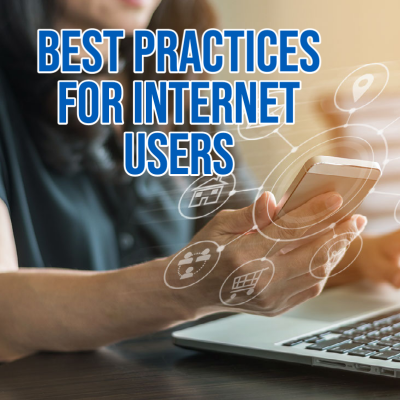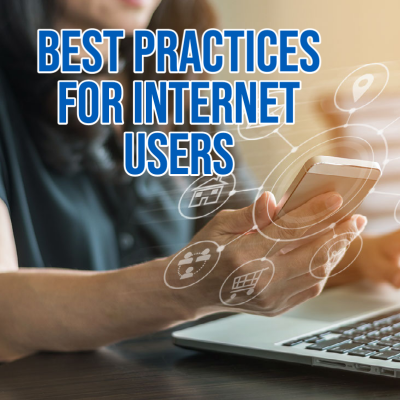Best Practices for Internet Users
Posted on Mar 28, 2023
Passwords
-
Use strong passwords – Passwords should be complex, use long phrases and a mixture of capital and lowercase letters, numbers, and special characters.
- Keep passwords a secret and safe – Do not share passwords with anyone. Keep them in a secure place if written down.
- Change passwords frequently.
- Use different passwords for different accounts; never use the same password for business and personal accounts
Electronic Devices and Software
- Keep software and electronic devices (i.e. Computer, smartphone, tablet etc.) up-to-date – Make sure the electronic devices and software are updated on a regular basis. Regularly check that each of your computers has up-to-date software installed, including operating system, personal firewall, anti-virus, anti-spyware and current browser. Ensure your anti-virus and anti-spyware software is enabled and execute scans on a consistent basis. Use trustworthy internet tools to scan your browser for known weaknesses.
- Install antivirus software – Try to install an antivirus that can monitor and protect the computer from viruses, spyware, and malware. Encrypt sensitive data and keep updated anti-virus, anti-malware, and anti-spyware protection on your computers.
- Be cautious with external media – external media like flash drives can have harmful viruses stored on them.
- Do not use unprotected internet connections - (i.e. networks with no password)
Websites
- Try to use websites that are secure.
- Use encrypted websites – Encrypted websites have a closed padlock in the address bar or in the bottom right corner of the web browser.
- Be cautious of downloading malware – Be careful of opening attachments or clicking on links in an email or on social networks.
- Don't send sensitive information – Do not send sensitive information via the internet (email and instant messages). These methods can be intercepted and read.
- Be cautious of phishing scams – Phishing comes in the form of an email that is trying to get sensitive information like Social Security Numbers or accounts. Planters First Bank will never ask for account or personal information in an email.
- Don't use a public computer for financial transactions – Using a public computer or wireless connection may be unsafe. Always monitor your accounts for suspicious transactions.
- Be cautious shopping online – Shop from respectable and trustworthy sites. Save a copy of any purchases made online.
- Watch out for suspicious activity - do not open suspicious e-mails and never share account information.
Social Media Security Tips
- Set the privacy and security settings on your social networking channels to a level that you are comfortable with for information sharing.
- Be aware of how much personal information you post on channels. Private information should never be shared including date of birth, and social security number, etc. A hacker could use this information to steal your identity or access your data.
- Do not publicize that you are on vacation or away for a lengthy period of time.
- Do not click on hyperlinks within a post or text message if it appears suspicious, even if you assume it is coming from a friend. Your friend's account may have been hacked or infected and could now be distributing malware.
- Once you post information online, it remains online. Guard your reputation by assuming everything you post online is permanent.
Victim of a scam? Act quickly
- File a police report – Also report to the U. S. Federal Trade Commission @ ftc.gov/idtheft or call 1-877-438-4438.
- Close Accounts – Close any accounts accessed or opened fraudulently. Open new accounts with new passwords and PINs.
- Place a fraud alert on your credit reports – Contact one of the major U. S. credit bureaus so no financial institution grants new credit without approval. Make sure the other two credit bureaus are contacted. Get a free credit report and dispute any issues, such as accounts open with knowledge.

